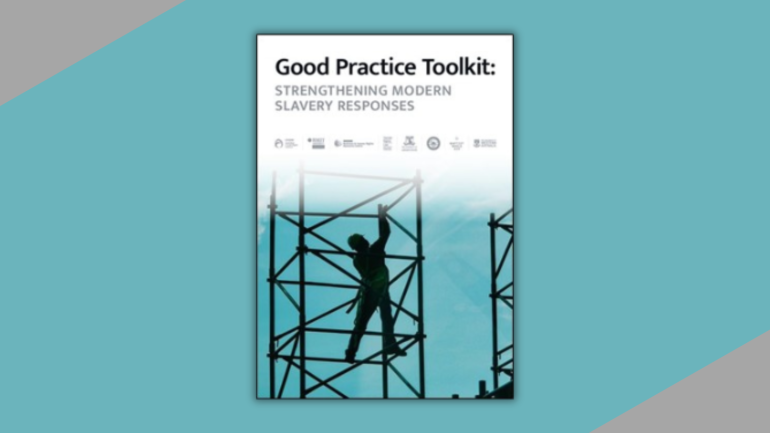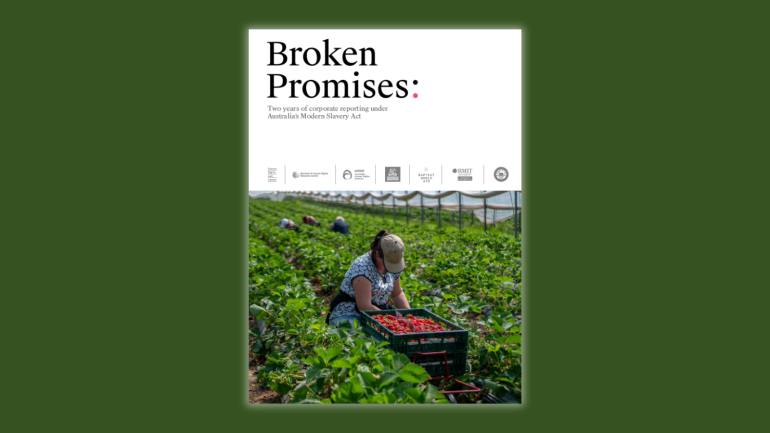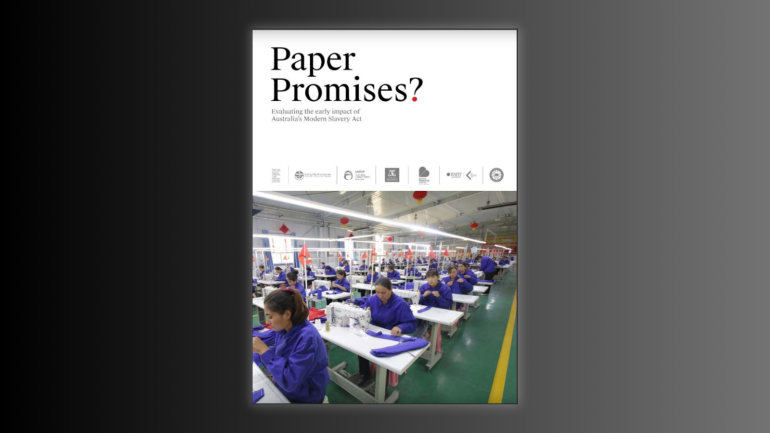Why are we doing this research?
Modern slavery is a growing phenomenon. In 2018 Australia introduced the Modern Slavery Act which requires businesses to report on their risks of modern slavery in their operations and supply chains. The Act is one of a growing number of national regulatory regimes that seek to address corporate human rights breaches in supply chains.
This project will improve understanding of modern slavery risks in global supply chains by identifying and better understanding which sectors have a high risk of modern slavery, and how risk factors differ across sectors. The project focuses on companies operating in four sectors with known risks of modern slavery: garments from China, rubber gloves from Malaysia, seafood from Thailand and fresh produce from Australia. In the context of these high risk sectors, it will examine:
- What practices are businesses adopting to combat modern slavery?
- How do these practices address specific sectoral risks?
- How do practices align with - and how are they informed by - standards and guidelines beyond the Modern Slavery Act?
- Are these practices effective in combatting modern slavery?
- Are reporting entities adopting effective approaches to identify and remediate modern slavery that improve working conditions and reduce instances or severity of modern slavery in their operations and supply chains?
Our research aims to provide tools, resources and guidance to businesses, government and the community about the efficacy of reporting under the Modern Slavery Act. It will build an evidence-base that informs new business practices and sound policy responses by Australian government that include improving the Modern Slavery Act and other policy approaches.
Our impact
Publications
The fourth and final publication in this collaborative research project, the Good Practice Toolkit, draws on findings from the multi-year project showing how companies are responding to the Modern Slavery Act and conducting human rights due diligence. It identifies and addresses two areas of business practice that are notably weak: engagement with stakeholders; and engagement with suppliers.
The Good Practice Toolkit provides guidance on how to approach these areas as part of a broader human rights due diligence process and highlights good practice examples from both reporting entities and other businesses.
Australia’s Modern Slavery Act: Is It Fit For Purpose?, the third report released in this multi-year collaborative project, featured the results of a detailed survey of nearly 90 business groups on the impact of Australia’s Modern Slavery Act. Supported by in-depth focus groups, the research found that, of the businesses surveyed:
- 70% support the establishment of an Anti-Slavery Commissioner.
- 67% would find it easier to comply with the Modern Slavery Act if it were harmonised with international standards such as the UN Guiding Principles on Business and Human Rights.
- 61% would likely improve modern slavery responses if required to undertake human rights due diligence.
- 54% would likely improve modern slavery responses if financial penalties were introduced.
The report, Broken Promises: Two years of corporate reporting under Australia’s Modern Slavery Act, examined the second year of corporate statements submitted to the Government's Modern Slavery Register by 92 companies sourcing from four sectors with known risks of modern slavery: garments from China, rubber gloves from Malaysia, seafood from Thailand and fresh produce from Australia.
It found that:
- 66% of companies reviewed are still failing to comply with the basic reporting requirements mandated by the legislation, with some companies not submitting reports at all;
- 56% of the commitments made by companies in the first year of reporting to improve their modern slavery response remained unfulfilled based on their second year statements;
- 43% of companies reviewed are still failing to identify obvious modern slavery risks in their supply chains;
- There is a 6% increase in the number of companies appearing to be taking some form of effective action to address modern slavery risks, with two in three companies still failing to act.
The project's first report, Paper Promises? Evaluating the early impact of Australia’s Modern Slavery Act, was released in February 2022. It examined the first publicly available modern slavery statements of 102 companies in four sectors with known risks of modern slavery (garments from China, rubber gloves from Malaysia, seafood from Thailand and fresh produce from Australia). It found that:
- 77% of companies reviewed had failed to comply with the basic reporting requirements mandated by the legislation;
- 52% had failed to identify obvious modern slavery risks in their operations or supply chains. Only one in four garment companies sourcing from China, for instance, made any mention of the risk of Uyghur forced labour in their supply chains;
- Just 27% of companies appeared to be taking some form of effective action to address modern slavery risks.
Submissions
- Consultation on Modern Slavery and Worker Exploitation (New Zealand): A Legislative Response to Modern Slavery and Worker Exploitation (2022), Vikram Bhakoo, Martijn Boersma, Fiona McGaughey, Justine Nolan, Amy Sinclair.
- Modern Slavery Act 2018 (Cth) Review (2022), Justine Nolan, Fiona McGaughey, Martijn Boersma.
- Submission to Review of Australia's Modern Slavery Act 2018, Human Rights Law Centre.
- Submission to Attorney General's Department of the Australian Government in relation to the Review of the Modern Slavery Act and related Issues Paper, Business & Human Rights Resource Centre.
Media
- The evolving implications of Australia’s modern slavery laws, Lawyers Weekly, 31 August 2023.
- Business groups want tougher action and commissioner to deal with modern slavery: report, The Mandarin, 6 April 2023.
- Companies fail to act on modern slavery, ABC RN Breakfast, 17 November 2022.
- Corporate Australia idle on modern slavery, ABC PM, 17 November 2022.
- Australia’s modern slavery law not working, report says, AlJazeera, 17 November 2022.
- Two Thirds Of Businesses Failing To Comply With Modern Slavery Act, Triple M, 17 November 2022.
- Seafood, rubber gloves, oranges: the products you buy in Australia could be linked to modern slavery, SBS, 19 November 2022.
- Government urged to strengthen Modern Slavery Act, CHOICE, 21 November 2022.
- Ending modern slavery, Business News, November 2022.
- Broken Promises: Two years of corporate reporting under Australia’s Modern Slavery Act, RTR 92.1 FM, 7 December 2022.
- Australia’s modern slavery laws called into question, The Australian Financial Review, 7 February 2022.
- Calls for federal government to strengthen modern slavery laws after scathing report, SBS, 7 February 2022.
- Australian companies failing to prevent links to modern slavery, human rights groups warn, ABC News, 7 February 2022.
- Australia’s modern slavery laws are ‘seriously lacking’, Lawyers' Weekly, 7 February 2022.
- New report shows companies failing to comply with modern slavery laws, Media Release, 7 February 2022.
Events, engagements and video
Who we are
Testing the effectiveness of Australia’s Modern Slavery Act is being undertaken by a consortium of academics and non-government organisations:
- Australian Human Rights Institute, UNSW Sydney, Professor Justine Nolan and Research Fellow Samuel Pryde.
- Baptist World Aid Australia, Peter Keegan
- Business & Human Rights Resource Centre, Amy Sinclair
- Human Rights Law Centre, Freya Dinshaw and Keren Adams
- RMIT University, Business and Human Rights Centre, A/Prof Shelley Marshall
- University of Melbourne, Department of Management and Marketing, A/Prof Vikram Bhakoo,
- University of Notre Dame Australia, School of Law and Business, A/Prof Martijn Boersma
- University of Western Australia, School of Law, Dr Fiona McGaughey
How is this research funded?
In December 2020, the Australian government through the Department of Home Affairs launched a five-year National Action Plan to Combat Modern Slavery . As part of this, a A$1.7 million fund for grants was established to combat modern slavery, to improve business capacity to confront modern slavery in supply chains and to provide evidence-based advice and policy recommendations. The consortium made a successful bid, securing A$177,000 to undertake the two-year project.
Cover photo: Azamat Imanaliev/Shutterstock



